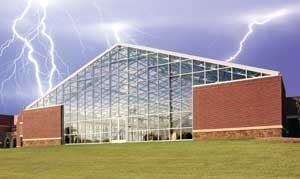In 2008, Tom Griffiths and Matthew Griffith co-wrote an article for Aquatics International titled “When Lightning Strikes,” in which they took aim at a popular “urban legend” in aquatics that says indoor pools [waterparks included] should close in the event of lightning.
Aquatics International later followed up the piece with a poll in 2013 asking readers whether or not indoor facilities should have a lightning policy. Despite the article’s popularity (to date, it remains the most read article ever to be featured on Aquaticsintl.com), and the information it presented, at that time, 80 percent of the survey participants voted “yes.”
Seven years later, even with advancements in lightning tracking technology, Griffiths’ opinion has not changed. In fact, if anything, the founder and president of the Aquatic Safety Research Group feels even more strongly that his viewpoint is correct.
“I still believe swimming indoors is one of the safest places you can be during a lightning storm,” he says. “We have not heard of one fatality ever in this regard. I don’t think there is another swimming activity that can make such a claim.”
Not everyone agrees. For example, the Washington, D.C. Department of Parks and Recreation recently implemented a rule for all of the capital city’s indoor pools and will evacuate them when there is a confirmed lightning strike within five miles of the facility. The decision to do so was based on information provided by the American Red Cross and the National Lightning Safety Institute.
But Griffiths argues these policies are based on false information and propelled by fear and not statistics.
Here, we highlight five main reasons Griffiths believes it is unnecessary to close an indoor pool during a lightning storm. Do you agree? Let us know by taking our updated survey at the end of this story.
1) ZERO CASES. There are no known lightning hits in indoor pools. Thanks to the proliferation of social media, if there had been one, everyone would know about it. “If someone in an indoor pool was killed by lightning, it would be such a sensational and scary story all the media outlets would have it,” he says. “Just think of shark attacks. When we do have a rare hit, everyone in the world is showing it on YouTube, cell phones and TV. But we don’t stop going to the beach. And sharks are always present; they just rarely bite.”
2) PROPER CONSTRUCTION. More than likely, the zero hits is due, in large part, to the National Electrical Code requirement for all buildings to be properly grounded and bonded and to have a complete lightning protection system. Just as you would with your rescue equipment, a facility’s staff should be trained to recognize any potential electrical issues and building’s should regularly be inspected by an electrician. This includes the power equipment, power washers, vacuums, etc.
3) INCREASED RISK. When people do evacuate a pool, they tend to do things that would put them in more danger during a storm than if they remained in the pool, he says. Showering, washing hands in a sink, and using a landline telephone all have been documented as scenarios in which a person has been injured by lightning. Of course, walking in a parking lot leaves a person exposed to lightning, and driving in rain always increases the odds of having an accident.
4) LOSS OF PATRONS. The more you close a facility unexpectedly, the more you run the risk of ostracizing the public, ultimately forcing those potential customers to go elsewhere. “When you are constantly and abruptly cancelling swim practice, swim lessons, and fitness swims, people take up another indoor activity where they won’t be stopped in the middle,” Griffiths notes. “[It’s] tough for pools to do business that way.”
5) MISLEADING INFORMATION. The National Lightning Safety Institute, the leading agency that strongly advises against keeping facilities open during lightning storms, has been found to misquote organizations thereby misleading facility operators, according to Griffiths. For example, the institute claims that the National Collegiate Athletic Association recognizes “building interior pool hazards when nearby thunderstorms threaten,” he explained in the 2008 article. However, The NCAA Swimming and Diving Rule Book, NCAA Sports Medicine Handbook, and NCAA Championships Severe Weather Policy only address outdoor pools, which he believes should be evacuated during lightning. Further, if there were accurate evidence to support a policy, Griffiths says he would be on board.
What is your current indoor pool or waterpark lightning policy and would you change it? Take our survey and share your thoughts with your peers.



